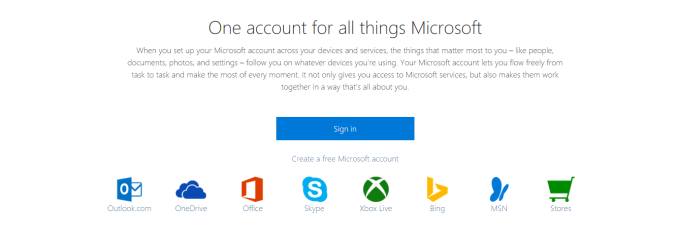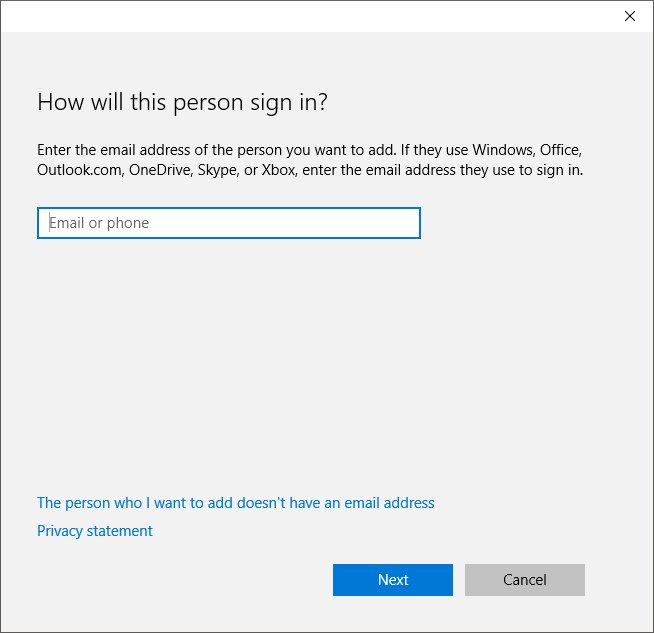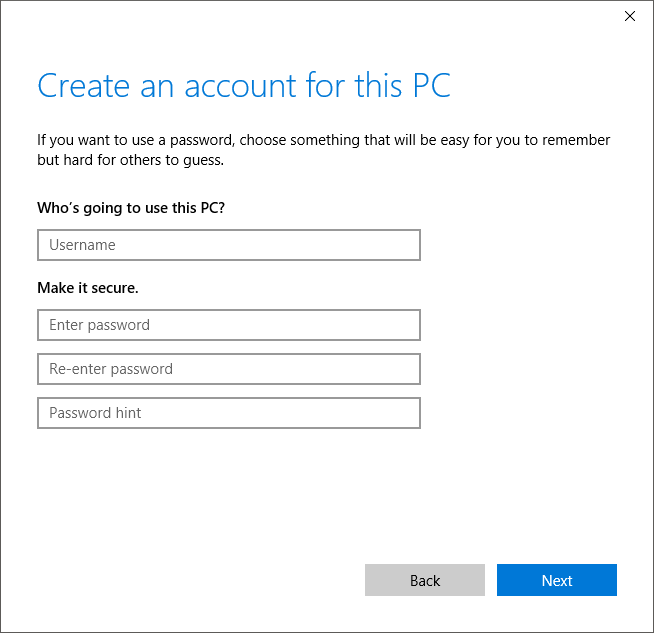The Windows 10 Review: The Old & New Face of Windows
by Brett Howse on August 25, 2015 8:00 AM EST- Posted in
- Operating Systems
- Microsoft
- Windows 10
Why Do I Need a Microsoft Account?
In all versions of Windows up to and including Windows 7, you would create a local account on the computer with a username and password, and log in. Business customers could also have an Active Directory domain, which would allow workers to log in with one set of credentials on any approved domain joined workstation.
Windows 8 introduced the construct of logging into Windows with a Microsoft Account. Logging in with your online profile for Microsoft would then also log you into all of the online services, such as OneDrive for cloud storage, Skype for messaging, and email through outlook.com or Hotmail. Other services, such as weather, could sync your favorites across devices. It also allowed you to optionally sync your computer layout across devices, so your desktop wallpaper, theme, and even your Start Screen layout could all by synchronized across any Windows device you logged into. Also, any password changes would be synchronized as well.
There is certainly people who do not want this though, and Windows 8 made it very difficult to use the Microsoft services if you were not logged in with a Microsoft Account (MSA). During initial setup, the default prompt is to set up the computer with a MSA and although you could bypass this step and create a local account, it was somewhat non-obvious.
For Windows 10, Microsoft has backed off on this somewhat. During setup, the local account option is still not the default, but it is more obvious that you can bypass the MSA login. Most of the built in apps also support login individually rather than at the system level, which gives you the option to log into those services individually if you want to use them, or you can use multiple accounts for things like Xbox in case you have a different profile for that.
Adding a user defaults to MSA but you can choose the link at the bottom to switch to Local Accounts
I think they have found a much better balance with Windows 10 in this regard. Local accounts can now be used without really forcing you to use a MSA for everything. You will lose some features, such as Cortana, if you don’t use a MSA, so it’s not 100% the same but for the people who don’t want to log in with a MSA this is maybe just the way they want it.
So do you need a MSA to use Windows 10? If you want the best and easiest experience, then yes you should use a MSA for Windows 10. You will get the features that we have come to expect from modern systems such as the ability to sync passwords, themes, and more. Hopefully Microsoft will bring back the ability to sync the Start Menu layout like it had in Windows 8 as well, at least as an optional toggle. Windows 10 leverages cloud services for a lot of the functionality, and in order to use these services you have to be logged in. It’s certainly not anything most people are not accustomed to with the rise of smartphones, but there are certainly going to be desktop users who prefer to not log in with their online profile, and for those people they should find the experience a lot better than Windows 8.













293 Comments
View All Comments
prophet001 - Tuesday, August 25, 2015 - link
The spyware aspect of this OS bothers me. I'll be using Windows 7 until this is reconsidered.Michael Bay - Tuesday, August 25, 2015 - link
So, the same spyware.prophet001 - Tuesday, August 25, 2015 - link
Windows 7 doesn't even begin to approach this level of intrusion.Michael Bay - Tuesday, August 25, 2015 - link
As long as you believe that.wishgranter - Tuesday, August 25, 2015 - link
The Windows 10 EULA and Microsoft's Privacy Statement declare that Microsoft will access and use the content of people's emails and other files, such as documents uploaded to One Drive, according to Microsoft's discretion. "Share with our partners" also includes law enforcement, wherever Microsoft deems required. And I think Microsoft cannot ignore any instance which they feel should be forwarded to law enforcement without making themselves complicit in any potential criminal activity.Windows 10's all-your-contents-are-belongs-to-us policy is also a widening of the backdoor which law enforcement asks OS manufacturer to build into their systems.
Basically, Microsoft's Windows 10 EULA claims that all files used in Windows 10 may be accessed, searched, and contents utilized by Microsoft, with Microsoft exercizing sole discretion over what it will access, and how it will be used.
I think all businesses, content creators, and even nations should be dismayed at this. It looks like Russia already is concerned with Windows 10's always-on espionage against its users:
http://www.rt.com/politics/312172-windo ... ent-stirs/
If people will recall, Microsoft was previously found to be snooping in people's Outlook emails, and this discovery caused a furor among people, leading to Microsoft saying they would not do this anymore:
http://www.wired.com/2014/03/microsoft_vigilante/1
http://www.theverge.com/2014/3/20/55314 ... l-policies2
But now, Microsoft has made it a guaranteed policy of Windows 10 that they will always do this:
https://www.microsoft.com/en-gb/privacy ... fault.aspx
"Content. We collect content of your files and communications when necessary to provide you with the services you use. This includes: the content of your documents, photos, music or video you upload to a Microsoft service such as OneDrive. It also includes the content of your communications sent or received using Microsoft services, such as the:
- subject line and body of an email,
- text or other content of an instant message,
- audio and video recording of a video message, and
- audio recording and transcript of a voice message you receive or a text message you dictate."
Shouldn't there be a much bigger furor over the discretionless snooping of Windows 10, which includes all Outlook emails, than there was over just Outlook on its own?
Are people OK with their PCs contents no longer being their sole domain and in their privacy, but instead being fully open to Microsoft?
I'm not. I'll be sticking with Windows 7 for now.
Windows 10's motto: Your System is not Your Own
xenol - Tuesday, August 25, 2015 - link
You're reading the TP EULA. The actual Windows 10 EULA is at http://www.microsoft.com/en-us/Useterms/Retail/Win... , which defers the privacy stuff to Microsoft's privacy statement ( https://www.microsoft.com/en-us/privacystatement/ )Which says none or few of the things in the TP EULA (the only one I found in common is they may look at anything you upload to OneDrive, which you can disable on Windows 10 anyway)
Grooveriding - Tuesday, August 25, 2015 - link
Really unfortunate how far Microsoft went with privacy invasion and data trolling with Win 10. Fortunately you can disable what appears to be all of it with options, registry tweaks and disabling services.I would also recommend running a draconian firewall such as Tinywall that blocks all internet traffic and you have to allow applications on a case by case basis. As well as editing your hosts file to block all traffic back to Microsoft's data collection servers. As well, never use the OS with an MS account, just use a local account.
Pretty outrageous MS does not offer an option to disable everything without having to resort to these measures.
hansmuff - Tuesday, August 25, 2015 - link
The "sharing with law enforcement" is automatic for any data Microsoft has. If you're on 7 and use OneDrive, well there you go.Regarding the recording of voice data, that's a given with all of them. Siri, Google, now MS all use online services to improve detection and of course otherwise use that data. And they all send your recorded voice in some form or shape to their servers.
I can see how you'd tie it to Windows 10 because that centralizes a lot of those "new generation" of services that are in the cloud. But those services exist with or without Windows 10. I think it's wiser to educate people about what "the cloud" implies, which is exactly what you say; people do not have control over the data they store.
It's a cloud issue, and the cloud has provided the perfect vehicle for the likes of Apple, Google and Microsoft to take what they want. This goes for your PC, phone, tablet, everything.
Notmyusualid - Tuesday, August 25, 2015 - link
None of my phones or PCs send anything to the cloud.It is called privacy common sense.
Matts8 - Tuesday, August 25, 2015 - link
What phone do you have?